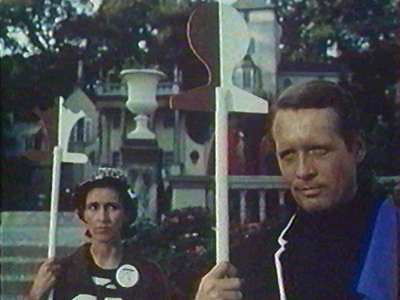 "Come be the queen's pawn"
"Come be the queen's pawn" (Revised 01/03/2023)
In terms of The Prisoner, that episode would have to be "Checkmate," one of the best-directed and well-scripted episodes of the series. Every line has a double meaning, every act seems to fit in place...and the ending is one of the bleakest ever done for a series set in the 1960s...and maybe in all of television.
The episode sets out its imagery at the outset - a huge chess game run by two individuals on opposing sides. Number 6, still relatively new, wishes to escape. If ever a show wore its imagery and themes on its sleeve, "Checkmate" does so almost five minutes into the episode. (It also expands on a key line from the first episode - "We're all pawns, m'dear")
There's a very telling conversation between Number 6 and the "Chessmaster" (an ex-count whose country used to hold such games...and the loser lost their heads. Literally), which sets the stage for the main theme of the episode, namely, the dynamics and duality of power:
Number 6: Why do you use people?
Chessmaster: Some psychiatrists say it satisfies the desire for power. 'the only opportunity one gets here.
Number 6:That depends what side you're on.
Chessmaster:I'm on my side.
Number 6: Aren't we all?
Chessmaster: You must be new here. In time, most of us join the enemy...against ourselves
During the midst of this match, Number 6 attempts to engage the Queen in an escape plan...but witnesses the Rook making an independent move...and the plot begins to move forward. We are soon caught in Number 6's plans to escape the Village, his learning about how the Village operates, and the subtle shadings of power that permeate all of the relationships in the Village.
One of the great aspects of this episode (which I never really appreciated until now) is the almost clockwork efficiency of the plot: soon, we learn why the Rook is on the island (he invented an electronic defense program which, naively, he felt every county in the world should know about), and Number 6 begins to use the Rook as part of his plans. It's also the first episode that moves from Cold War-style espionage thriller to allegory, as Number 2 proclaims, "In society, one is expected to conform." The Rook receives severe Pavlovian-style conditioning to deter him from independent thinking...and you would think that he would avoid Number 6...but as we learn, things are not always as they seem.
During this time, one of the Village scientists decides to utilize the Queen in a gambit - condition her to "fall in love" with Number 6, attach an electronic device to her, and she can serve as a tracker. (And to extend the chess metaphor, all of the characters - even Number 6, in an ironic way, at the end - perform very restricted, limited moves, and variation from those is dealt with.) Although it seems rather tacked on - and Number 6 catches on too easily - it's a gambit used to distract Number 6, to keep his attention away from the real game on the board; after all, the very technology in the Queen's locket fits Number 6's makeshift radio a little too well.
As the plot progresses, Number 2 - played by Peter Wyngarde (who would have later career problems after being "found out") - seems calm and dispassionate. Originally, I had never liked his portrayal, but watching the episode in isolation, I realize why he's so cold and aloof (except for a karate-themed outbreak towards the end)...after all, as in poker, a chess master never lets his feelings betray him during the game in play. Yet, Number 6 did - as the Wyngarde Number 2 points out, it was the former's "subconscious arrogance" that led the Rook to believe he was a warden and not a prisoner. By implication, Number 6 brought his failure upon himself - after all, had he not taken the initiative, Number 6 would have just been seen as another resident. However, Number 6 never counted that some people cannot, as stated earlier, tell "whose side" anyone is on.
Finally, the ending of the episode - the sequence in question begins 7:09 in this YouTube clip. It would have been easy to have the usual end-of-the-episode monologue; however, the direction and musical score help create a solid gut-punch to an episode that is one of the most multi-layered episodes in the series.
You sure didn't see this on The Mod Squad, that's for sure.
Coming soon: The episode has originally broadcast as episode two. The only two-time Number 2. And, of course, the obligatory "evil twin" episode...with a difference.
Be seeing you.

No comments:
Post a Comment